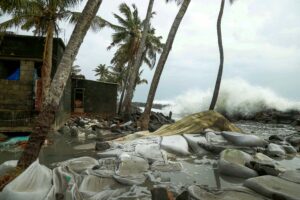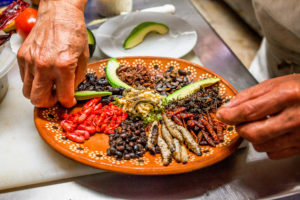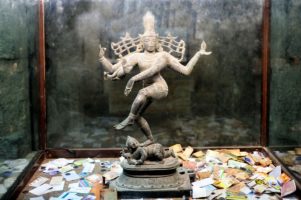Support Hidden Compass
We stand for journalism, science, history, and hope. Make a contribution to Hidden Compass and stand with us.
This place should come with a warning sticker. You know, like the advisories on the outside of certain compact disc cases: “Explicit content.” A sign that says “Fat, Middle-Aged, Pasty Guys: Beware” would suffice.
Come to think of it, maybe that was what was written on the fading, peeling sign I passed on my way in. Unfortunately, I can’t read Arabic.
It really wouldn’t matter anyway, because right now a large Moroccan man named Absalom is kneeling on my back, trying to elicit a scream from me, or at least a small crack from my spine. Well, he won’t hear a peep — not today, not in front of all these other men. As for my spine, it very well might crack in half soon.
~~
The hammam — a Moroccan bathhouse — whose worn concrete floor Absalom and I would practice our contortionism on, is just around the corner from the mausoleum of Moulay Idriss (the great-grandson of the Prophet Muhammed) in the town of Moulay Idriss Zerhoun (a Muslim holy city) in the heart of the Atlas Mountains. The hammam does not look like much from the outside, just two large wooden doors set into a traditional Moroccan keyhole doorway.
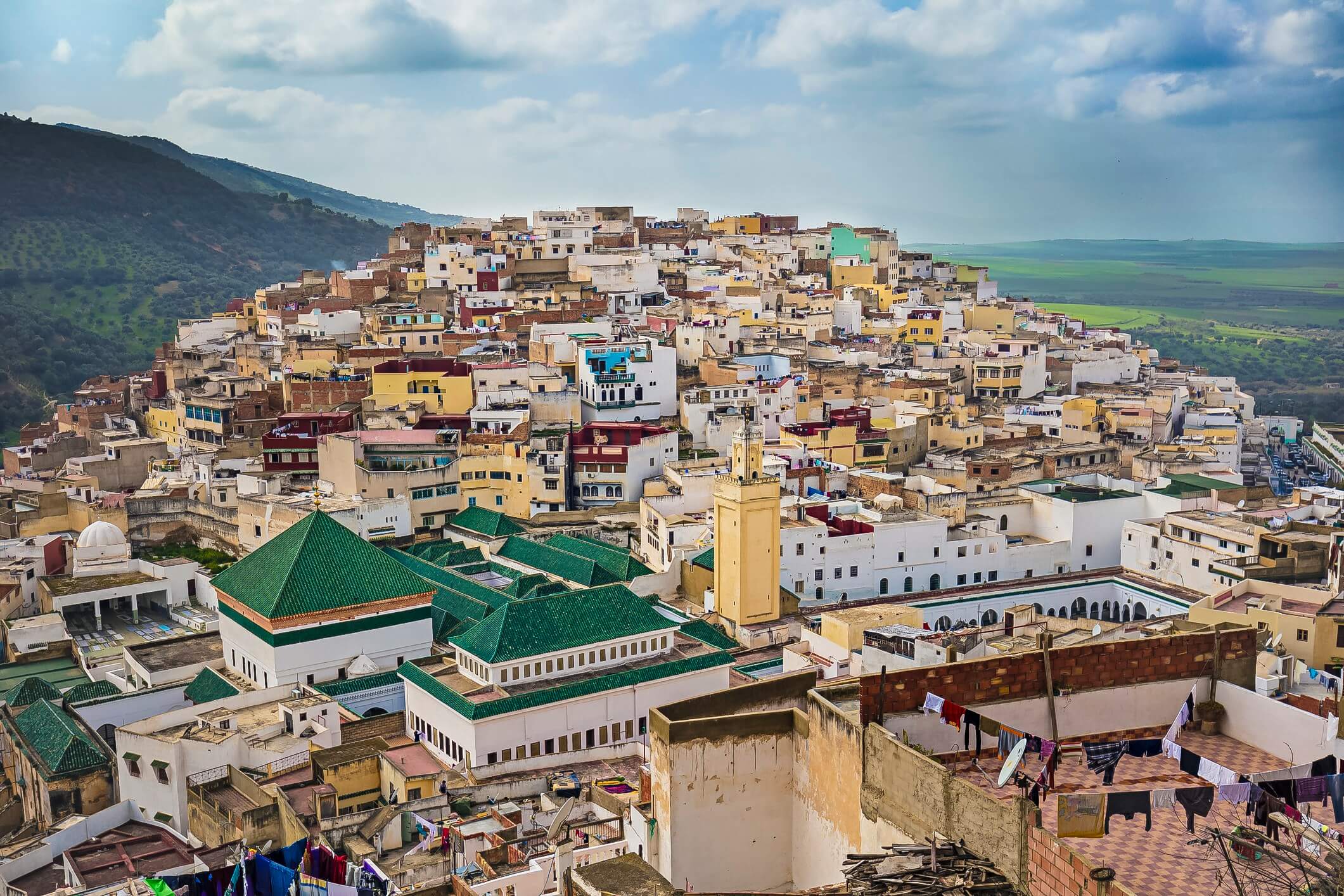
High view of holy city Moulay Idriss in Morocco. PHOTO: XAVIER ARNAU/GETTY IMAGES.
When I venture in, I find myself in a small room. Its dull, gray stone walls lined with wooden benches above which rows of rusting hooks protrude, waiting for clothes. Throughout the room are stacks of large, blue buckets scattered about the feet of a smattering of men in various states of undress.
Just inside the doorway, behind the battered wooden desk that has seen an unknown number of visitors, sits a small, smiling man with unruly black hair and crooked yellow teeth topped by a wisp of a mustache.
“Bonjour,” I say to him.
His grin spreads as he motions and mimes to me, signaling that he is deaf. Not that it matters much: My miniscule grasp of French would have mired me in confusion had he replied. He enthusiastically waves me towards the benches.
As I head to the nearest bench I notice a smiling, bald man waving at me. I walk over to him and ask him what we are supposed to do now, hoping he will offer some enlightenment.
He starts to laugh and says, “I don’t know, I’ve never been here before either.” This comes as a surprise, as this man, my friend Fernando, is a part-time resident of Moulay Idriss.
“I thought you might know,” he continues, “since you invited me.”
As I have learned during my travels in Morocco, what we think we know is often wrong.
A door suddenly swings open on the back wall and a large man dressed only in faded blue shorts with tattered red fringe and a pair of worn white flip-flops ambles over. Through a mix of Arabic, English, and French, Fernando and I get the gist of the plan: We are to strip down to our underwear, grab two buckets each, and follow the blue-shorted man through the door into the bowels of the bathhouse.
~~
As I have learned during my travels in Morocco, what we think we know is often wrong. Before I left, many people in the United States worried about me coming to a Muslim country. My father asked a thousand questions, all framed by the threat of violence that seems to seep into conversations about this part of the world these days: How would you ask for help if you needed it? Aren’t you worried about terrorists? Why would you want to go to such a dangerous part of the world?
But, from the moment I stepped off the plane in Fez, the swirl of individuals offering me help left me dizzy. Granted, many of them also wanted to be paid for their assistance, but they had a genuine warmth, not the iciness many had led me to expect.
From the tight walkways in the medina of that ancient metropolis to the meandering pathways of this holy city I have learned to expect the unexpected. Bugs Bunny underwear on display next to hijabs? Sure, why not. A dead camel’s head swaying over an old man rolling a cigarette in the market? Seems logical. So when I heard about the promise of relaxation in the hidden bathhouse just around the corner from the baker, I knew I had to go.
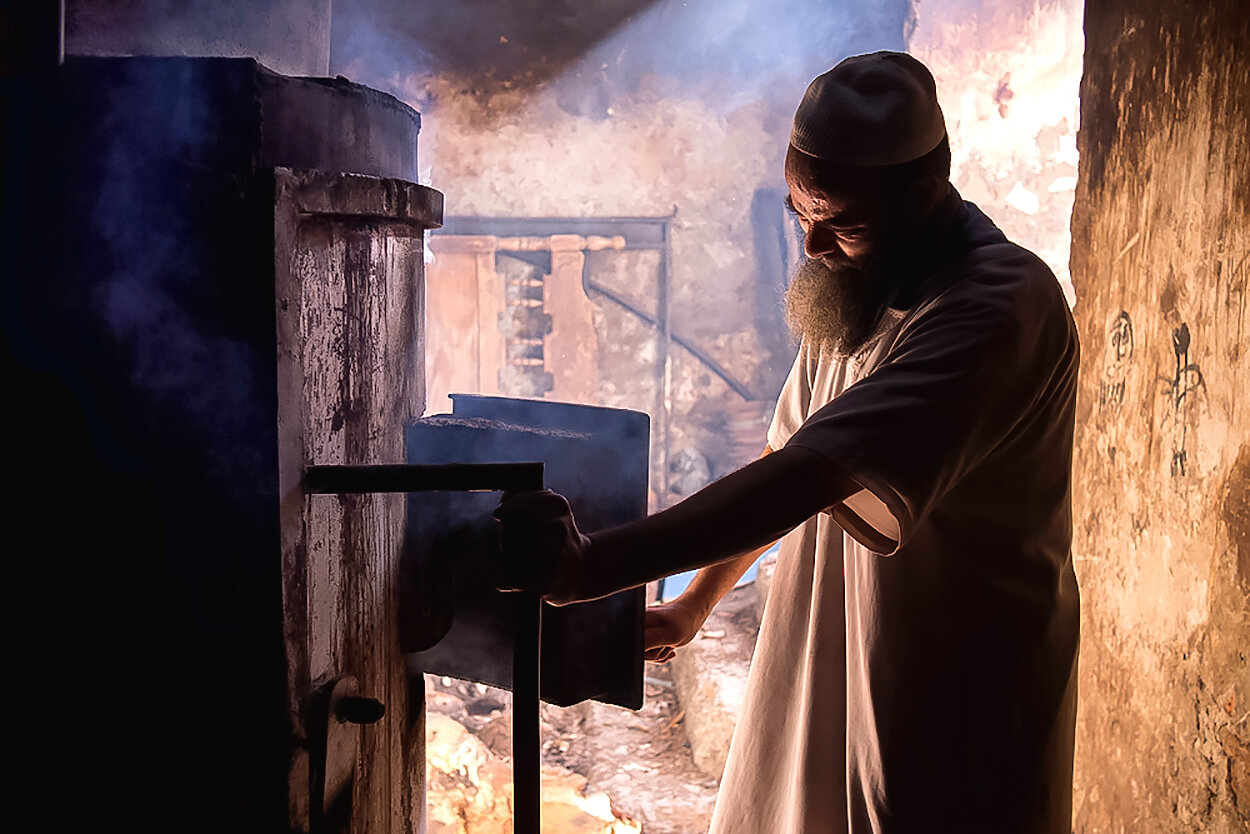
A man works the furnace in a traditional Moroccan hammam. PHOTO: GERES.
There is a defined system in Moroccan bathhouses to achieve relaxation. First, you dump hot-ass water all over yourself; it feels wonderful — it has a slight tang of minerals from the surrounding mountains. Next, sitting cross-legged on the floor, you soap and shampoo every inch of your body: It’s time to wash the dust and worries of the road from both body and mind. Following the purge, you then proceed to dump even hotter water over yourself as Absalom prepares buckets of scalding-hot and icy-cold water pouring from dull gray taps in the wall in mixtures he deems appropriate. He is a professional after all — you can tell by the sandals. Once you have thoroughly cleansed yourself, you’re instructed to lie flat on the hot floor and relax for at least ten minutes. A level of peacefulness descends upon you.
Don’t be fooled: where there is pleasure, pain is soon to follow.
I feel certain I must have deeply offended him in some manner, that he is taking out his displeasure upon me.
I am moments from a meditative trance when I feel a slight nudge on my shoulder. As my vision comes into focus, all I can see is Absalom’s bearded visage framed by the clouds of steam emitting from the pipes behind him. For a moment I do not recognize him: He looks almost holy. But this is not a movie and I am not going to meet God, Allah, nor an angel. Smiling, Absalom motions for me to sit up, then dumps yet another torrent of hot water upon me.
I am instructed to roll over upon my stomach. It is time to remove the dead skin encasing my body.
As Absalom enthusiastically attacks my body with his kiis (a coarse scrub glove) I feel certain I must have deeply offended him in some manner, that he is taking out his displeasure upon me.
“Good?” he asks me in heavily accented English. I can hear the pride in his voice.
“Très bien,” I grunt, spitting the words onto the floor through clenched teeth. To show weakness now would be unmanly, would disgrace all my fellow pasty-skinned foreigners.
Absalom proceeds to run his glove over every single part of my body that is not covered by my underwear. I really regret wearing briefs: Maybe some long-underwear would’ve been better. At the end of my exfoliation, I expect to see sheets of skin on the concrete, something to show the damage that had been done, but all I can glimpse in the darkness is that my skin seems to have a slight red glow about it, like the beginnings of a sunburn. I have a strange sense of sympathy for the large chunk of Parmesan cheese waiting in the fridge back home.
After the scrub comes a quick wash, and then the application of the sabon beldi (a black olive oil soap) that Abaslom liberally rubs all over my freshly filleted skin. I feel a million prickles of pain across my body: Anywhere my virgin skin makes the acquaintance of this strange soap, an argument erupts. As Absalom works it into my body he also massages me, working out all of the kinks that have accumulated from my travels. The feeling of a grown man I have never met before scraping me raw, then rubbing me down, is admittedly a bit strange.
Crack! My spine releases. I hear Absalom grunt with satisfaction behind me. He shifts to another position and dives back into his work. Within a few moments he has proceeded to twist me up like a pretzel. Every few moments he twists me in a different direction.
It is immensely satisfying, in a slightly sadomasochistic way. Kind of like drinking light beer with French food.
~~
The final dosing of fresh water leads to a moment of reflection. Sitting in a cooler corner while Fernando goes through the rite, I look around. All of the men here are in various stages of the routine I had just endured; I feel a slight bond with them, a shared Moroccan experience. We all deal with whatever life throws at us — families, jobs, politics — hopefully with a smile. We deserve these moments of peace before heading back out into the chaos of the streets.
As I walk towards the exit, one of the men slightly bows his head to me. I, a doughy foreigner used to Evian spritzes and gourmet massages, had been scalded, sanded, and smeared, just like he had. And, with the modest exception of my spine, not once did I crack under the pressure.
Hudson Lindenberger
Hudson Lindenberger lives to tell the stories that describe life, whatever they may be.
Never miss a story
Subscribe for new issue alerts.
By submitting this form, you consent to receive updates from Hidden Compass regarding new issues and other ongoing promotions such as workshop opportunities. Please refer to our Privacy Policy for more information.

